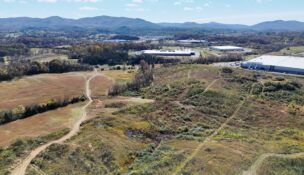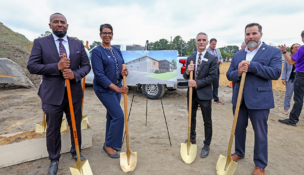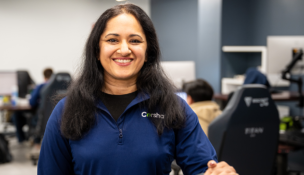Va. semiconductor alliance powers forward
Alliance launches with industry, academic summit
Va. semiconductor alliance powers forward
Alliance launches with industry, academic summit
Virginia’s initiative to become a bigger part of the country’s burgeoning semiconductor chip industry charged forward Tuesday with the public launch of an alliance intended to unite academia and businesses in developing talent and establishing manufacturing and research facilities.
Announced in April by Gov. Glenn Youngkin, the Virginia Alliance for Semiconductor Technology, or VAST, led by Virginia Tech, is funded by a $3.3 million grant from the state’s GO Virginia economic development initiative and includes plans to train 600 adult learners, with a focus on veterans and those from underserved communities, beginning in 2024, in addition to offering internships and certificates. VAST plans to create three 10-week Fast Track to Semiconductor Careers certificate programs: Chip Fabrication and Nano Characterization, Semiconductor Packaging and Characterization, and Semiconductor Equipment Maintenance and Repair.
Headquartered in the Arlington-based Virginia Tech Research Center, VAST includes George Mason University, the University of Virginia, Virginia Commonwealth University, Norfolk State University and Northern Virginia Community College.
On Tuesday, Youngkin, U.S. Sen. Mark Warner, Virginia Tech President Tim Sands and other partners gathered to sign a memorandum of understanding to focus on the state’s attempts to match momentum being created by the $280 billion federal Creating Helpful Incentives to Produce Semiconductors (CHIPS) and Science Act. The public memorandum signing was followed by a private summit between industry officials, including Idaho-based Micron Technology Inc., which has a plant in Manassas, as well as officials from academia, and the Virginia Economic Development Partnership and the Virginia Innovation Partnership Corp., in an attempt to inspire collaboration and attract more semiconductor businesses to establish a presence or expand in the commonwealth.
Speaking to the crowd at Northrop Grumman’s Falls Church headquarters, Youngkin said he is personally “engaged making sure that a robust economic incentive plan is presented to those companies that we think we want to go get. And you all are on the list. And so we are looking forward to working with you in order to beat the competition and have you come to Virginia”
Also among Youngkin’s goals from the event was developing a “clear path to launching collaborative research” among VAST’s university partners as well as “specific projects that might have not been either contemplated before today, or were being contemplated, but might not have been contemplated in Virginia.”
Virginia has lagged behind other states, including Arizona, New York, Michigan and Ohio, in building out its semiconductor industry. Intel Corp. considered Chesterfield County’s Upper Magnolia Green site for a $20 billion chip factory, but ultimately picked Ohio instead. Industrial site development has been a priority for Youngkin; he proposed $350 million for such projects in his 2022-2024 budget, which is still awaiting General Assembly approval. Officials at Tuesday’s even also noted Virginia’s deep bench of major top defense and aerospace contractors, with four of the world’s top five largest defense contractors now headquartered in Northern Virginia being a potential draw.
Rebuilding the nation’s semiconductor industry has also become a top U.S. national security priority in recent years amid a growing competition with economic rival China.
Youngkin announced VAST in April, days before he traveled to Taiwan, Japan and South Korea for his first international trade mission, during which he touted Virginia as a place for the semiconductor industry and its suppliers to thrive. On Tuesday, Youngkin said he was “encouraged” by that trip, where he met with industry and supply chain leaders. “I was also encouraged by the singularity of view that deeper relationships with the United States from all of the suppliers in Taiwan, in Japan and in Korea was top of their list,” Youngkin said. “And Virginia was a hugely competitive area for them to want to get to. So I feel confident that we will, in fact, see real benefits from our trip.”
Warner, who introduced an early version of the semiconductor legislation in 2020, added that he hoped the summit might accomplish “three or four leads that the governor and I can work on. There is a power when you’ve got a governor and your senior senator double-teaming a company to try to make the case [for] what we can do from the state standpoint [and] what we can do from the federal standpoint,” Warner said. “I think that combination is a good one and can provide wins.”
n


















